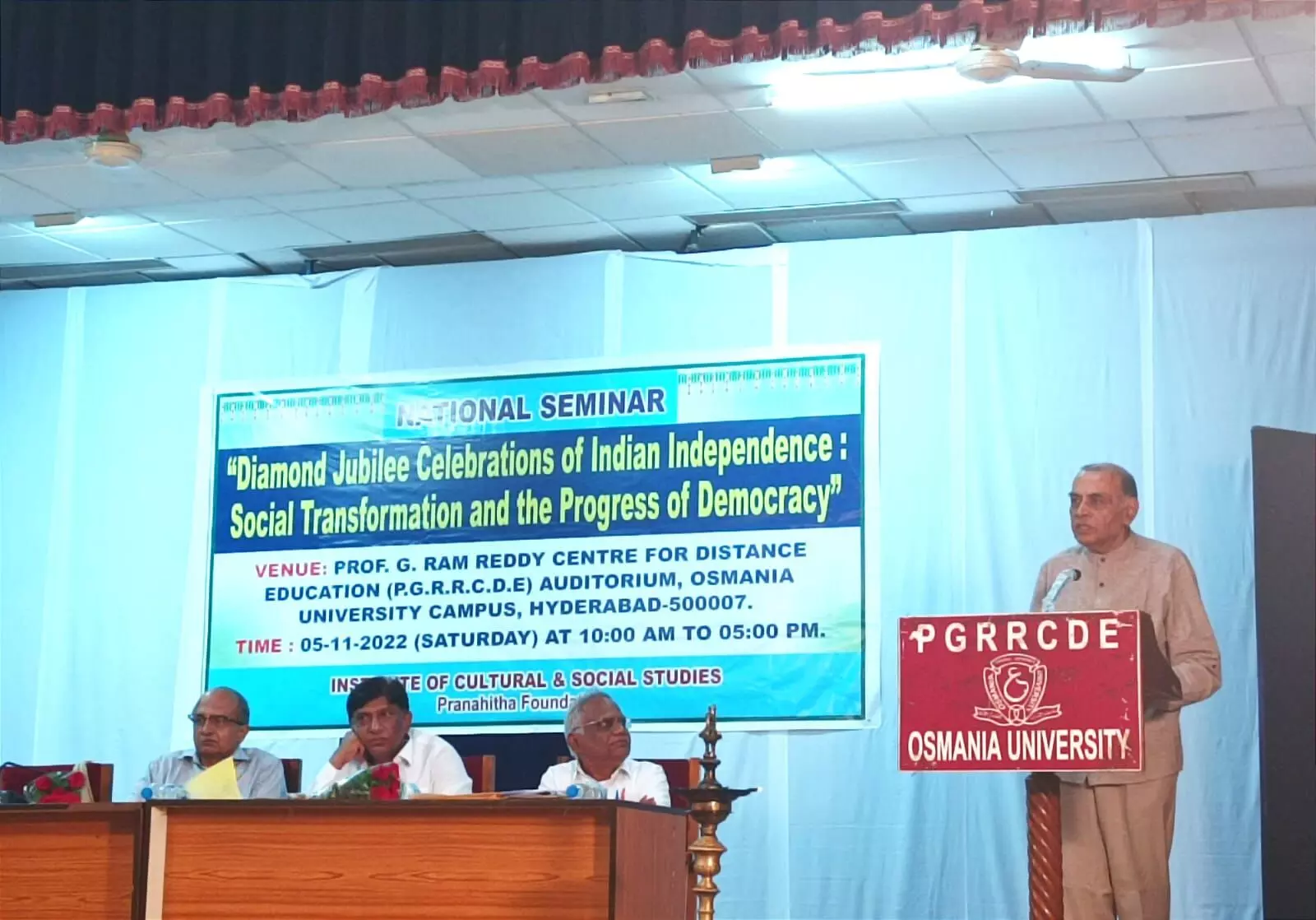Activists, academics discuss state of Indian democracy, judiciary at seminar held at OU
Padma Bhushan Prof. Ch. Hanumanth Rao, economist and former Planning Commission member; Prashanth Bhushan, lawyer and activist; B. Vinod Kumar, former MP and vice-chairman of the planning board, Telangana government; Prof. Anand Kumar, retired professor of JNU; and Prof. G. Satyanarayana, OU’s former principal participated in the session.
By Sumavarsha kandula
Hyderabad: On the occasion of the Diamond Jubilee celebrations of India's Independence, the Institute of Cultural and Social Studies, Pranahitha Foundation organised a national seminar on "Social Transformation and the Progress of Democracy."
The seminar was organised at the Prof. G Ram Reddy Centre for distance education (auditorium) in Osmania University on 5 November.
Padma Bhushan Prof. Ch. Hanumanth Rao, economist and former Planning Commission member; Prashanth Bhushan, lawyer and activist; B. Vinod Kumar, former MP and vice-chairman of the planning board, Telangana government; Prof. Anand Kumar, retired professor of JNU; and Prof. G. Satyanarayana, OU's former principal participated in the session.
Prof. G. Satyanarayana, who presided over the seminar, spoke about how the transformation of Indian society has been more rapid than ever. He further emphasised the need to critically evaluate, understand and analyse scientifically people's emerging socioeconomic and political conditions vis-a-vis the significant progress achieved thus far.
"We need to examine the need for a second freedom struggle or movement to construct a just and progressive society," he said.
People's participation in policy-making
Speaking at the event, Prashanth Bhushan said democracy in India is in crisis. He further spoke at length on the model of democracy, electoral politics, and the state of the judiciary. "Ours is not a participatory democracy, but a representative one," he said.
"It is not just about the right to vote, but we need to be involved in every step of policy making," he said speaking about the rights and duties of citizens.
Though being a representative democracy, Mr. Bhushan said we can still try to make it as participatory as possible.
Speaking about the steps to participate in democracy, he said, "First step is to decentralise power. Decisions that affect only a group of people should be decided by them. For example, the gram sabha or civic bodies of the cities should have the power to govern themselves."
The second step is to inculcate Initiative and Referendum, he added.
As we are a large population, Mr. Bhushan said everyone's ideas can't be considered. "But we can take the approach of initiatives and referendums, that is if 10% of people of a community or area put across a proposition, that policy or idea should be considered for a referendum," he said.
Mr. Bhushan also suggested that "the draft of the law, before being introduced in the Parliament, be made public so that citizens can express their views." Hea added, "This will assure a minimum level of participation from the people in policy-making."
About parliamentary committees, he said, "We had the provision for important laws to be presented before the standing parliamentary committees, but those have been made redundant under the Modi regime."
Each of these committees has 31 members – 21 from Lok Sabha and 10 from Rajya Sabha. These members are to be nominated by the Speaker of the Lok Sabha or the chairman of the Rajya Sabha. The term of office of these committees does not exceed one year.
He said laws are being passed as money bills. "This is illegal, and nearly 40 laws have been introduced in this manner to date, which means they do not need to be passed in the Rajya Sabha," he added.
Electoral politics
The lawyer and activist said elections are a money game. "Visibility has become directly proportional to money spent. The political parties that cannot spend huge amounts of money are not even visible or discussed," he said.
He further explained this is also because of not giving importance to vote shares. "A party or candidate might have a larger vote share, but only the one with simple majority gets to rule," he said, and added that electoral bonds have no limit, and no one can know who is donating the money. Mr. Bhushan asked, "How can one claim anonymity is transparency?"
He added, "Seventy per cent of the money through electoral bonds go to BJP, and the rest 30% towards all other parties."
Collapse of the judiciary
Mr. Bhushan spoke at length about the collapse of the judiciary. He opined, "The government should not offer post-retirement jobs to judges, but the filing of dossiers against judges is more lethal."
He added, "They try to find any weak link against the judge or any of their close family members to keep them on the government's side. Government agencies are being used to collect this information."
Later, Padma Bhushan Prof. Ch. Hanumanth Rao spoke about how globalisation has deepened the inequalities in India.
The economist said this is because of the already present socioeconomic inequalities in the country. "Caste, patriarchy, and other social structures have helped the already advantaged communities make use of these fault lines to further the gap between the rich and the poor," he added.
Former MP B. Vinod Kumar, agreeing with Mr. Prashanth Bhushan, said, "Transforming the electoral system is the way forward. If there is a need for change in the Constitution, that should be brought about."
Quoting the American President Thomas Jefferson, Mr. Vinod said, "Every generation is a new country."
Speaking about the way forward, Prof. Anand Kumar said the non-NDA governments have to show the way. He said there are four ways these governments can show contrast. "Creating employment, investing in health care, and providing better public education are primary. Lastly and most importantly, respect for civil liberties. The non-BJP governments should give space for dissent to breathe," he explained.